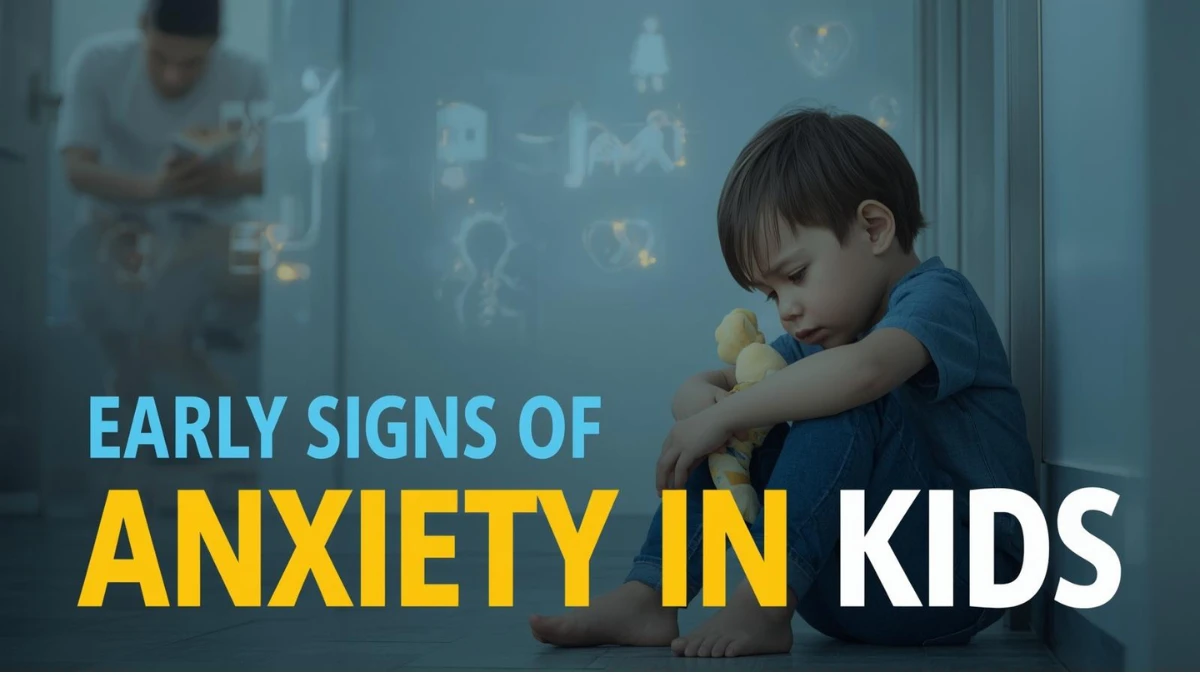👶 Learn the 6 early signs of anxiety and depression in kids. Protect your child’s mental health with expert parenting tips, coping strategies, and behavioral guidance.
Children, like adults, can experience anxiety and depression, but early detection is crucial for healthy emotional development. 😔 Many parents overlook subtle signs, which can lead to prolonged stress, behavioral issues, and academic challenges.
Here are 6 key signs every parent should recognize, along with practical tips to support mental wellness in kids.
1️⃣ Excessive Worry or Fear About Everyday Activities 😟
Children may show persistent worry or fear about school, friends, or seemingly minor daily events. They might repeatedly ask the same questions, seek constant reassurance, or express fears that appear disproportionate to the situation. These behaviors can affect academic performance, social interactions, and overall well-being.
Answer:
If your child frequently experiences nervousness, stomach aches, headaches, or reluctance to attend school, it could be an early sign of childhood anxiety. Recognizing these symptoms early and providing supportive communication, consistent routines, and access to professional counseling can prevent escalation into more serious anxiety disorders.
Real-Life Example:
Aarav, 9, often worried about minor classroom tasks and sought reassurance from his parents multiple times a day. With guidance from a child psychologist and structured daily routines, Aarav gradually learned coping strategies, reducing his anxiety and improving school participation.
Expert Quote 👩⚕️:
“Noticing excessive worry in children and addressing it early is key to preventing long-term anxiety disorders.” – Dr. Priya Kapoor
2️⃣ Changes in Sleep or Eating Patterns 🌙🍽️
Children experiencing anxiety or stress often show noticeable changes in sleep or eating habits. This can include trouble falling asleep, frequent nightmares, skipping meals, or sudden changes in appetite. Such behavioral signs may indicate underlying emotional distress that can affect overall development and mental health.
Answer:
Monitoring consistent changes in sleep or eating patterns is essential for parents to identify early signs of emotional distress. Establishing structured routines, balanced meals, and calming bedtime practices can significantly improve a child’s pediatric mental health and emotional resilience.
Real-Life Case Study:
Emma, 7, began skipping breakfast and struggled to fall asleep due to anxiety over school tests. With parental support, counseling, and consistent bedtime routines, her sleep improved, appetite returned to normal, and her overall anxiety decreased.
Expert Quote 👩⚕️:
“Changes in sleep and eating patterns are often the first behavioral signs of anxiety in children. Early recognition and supportive routines are crucial for mental wellness.” – Dr. Priya Kapoor
3️⃣ Irritability or Frequent Mood Swings 😡
Children experiencing anxiety or depression may display irritability, frequent crying, or unexplained anger, rather than the sadness adults typically expect. Mood swings can disrupt school performance, friendships, and family interactions.
Answer:
Sudden changes in mood, frequent outbursts, or withdrawal from loved ones can be red flags for emotional distress. Parents can help by maintaining open communication, validating feelings, and seeking therapy or counseling support. These steps promote emotional wellness in children and equip them with coping strategies for stress.
Expert Quote 👨⚕️:
“Irritability is often the primary symptom of depression in children rather than sadness.” – Dr. Anjali Desai
4️⃣ Withdrawal from Social Activities or Friends 🏠
A child may stop participating in hobbies, avoid friends, or refuse to engage in social interactions. Social withdrawal can be an early indicator of anxiety, low self-esteem, or depression, which may affect long-term social development if left unaddressed.
Answer:
Social withdrawal signals emotional distress. Encouraging safe, guided social interactions, group activities, and peer engagement can help children regain confidence and improve overall mental wellness.
Scientific Backing 🔬:
Research shows that children with anxiety or depression often avoid social situations, which can hinder social development and emotional resilience. Early intervention through counseling, structured play, and parental guidance supports long-term mental health.
5️⃣ Difficulty Concentrating or Decline in Academic Performance 📚
Children struggling with anxiety or stress may show difficulty concentrating, forgetfulness, or declining academic performance. Schoolwork can become overwhelming, and frustration may increase, further impacting emotional wellness.
Answer:
Academic challenges can be a manifestation of anxiety or depression. Collaborating with teachers, creating structured daily routines, and seeking professional support can help children regain focus and maintain both learning and emotional health.
Real-Life Case Example:
Liam, 10, experienced a sudden decline in grades due to anxiety-related concentration problems. With school accommodations, structured routines, and counseling, he regained focus, improved grades, and rebuilt confidence.
Expert Quote 👩⚕️:
“Declining academic performance can be an early behavioral sign of anxiety in children. Early support can prevent long-term stress and learning difficulties.” – Dr. Priya Kapoor
6️⃣ Physical Complaints Without Medical Cause 🩺
Children may report stomachaches, headaches, fatigue, or other physical complaints that have no underlying medical explanation. These psychosomatic symptoms often reflect emotional stress rather than physical illness.
Answer:
Observing patterns in physical complaints and discussing feelings openly allows parents to detect early signs of emotional distress. Prompt attention, supportive communication, and pediatric mental health consultation can prevent worsening anxiety and improve overall well-being.
Expert Quote 👩⚕️:
“Physical complaints can be the first sign that a child is struggling emotionally. Parents should listen carefully and act promptly.” – Dr. Rajiv Mehta
🌟 Bonus Tips for Supporting Kids’ Mental Health
- Encourage open communication 🗣️ – Let children express fears and concerns without judgment
- Maintain consistent daily routines ⏰ – Stability promotes emotional security
- Introduce relaxation techniques 🧘♂️ – Deep breathing, mindfulness, or guided meditation
- Seek professional support 🩺 – Pediatric mental health specialists can provide targeted guidance
📚 Sources (credible references)
- National Institute of Mental Health (NIMH) – Child and Adolescent Mental Health – https://www.nimh.nih.gov/health/topics/child-and-adolescent-mental-health
FAQs Section ❓
Q1: At what age can kids experience anxiety or depression?
A: Even children as young as 5–6 years old can exhibit signs of anxiety or depression.
Q2: How can parents differentiate normal stress from anxiety?
A: Persistent, excessive worry affecting daily life is a key indicator of anxiety.
Q3: Can lifestyle changes improve a child’s mental health?
A: Yes! Healthy routines, balanced diet, physical activity, and emotional support significantly improve mental wellness.
Q4: When should parents seek professional help?
A: If symptoms persist for more than a few weeks, worsen, or affect daily functioning, professional guidance is recommended.
💬 Call-to-Action
- “Have you noticed any of these signs in your child? Share your experiences below!”
- “Share this article with parents and caregivers to spread awareness about kids’ mental health!”
✅ Conclusion
Recognizing child anxiety symptoms early is critical for mental wellness and emotional resilience. Key indicators include excessive worry, sleep/eating changes, irritability, social withdrawal, concentration issues, and physical complaints.
By implementing supportive communication, structured routines, relaxation techniques, and professional counseling, parents can help children manage anxiety, improve academic performance, and build confidence. Early awareness and proactive intervention are essential for fostering healthy emotional development in children.










